U bent hier
Internet Archive
As the US Public Domain Expands, 20-Year Pause for the Canadian Public Domain Begins
Festivities are planned on January 19 to recognize Public Domain Day and embrace the possibilities of new works freely available from 1927.
In the United States, the recent declaration of the federal year of Open Science and the White House memo unlocking publicly funded research outputs has buoyed the open community and its outlook on knowledge sharing.
However, the celebration will be muted in Canada where librarians and educators are assessing the impact of a vast expansion of the copyright term.
Canada’s copyright protection for artistic works was extended as 2022 came to a close from life of the author plus 50 years—to life of the author plus 70 years. The change was the result of international trade negotiations in the United States-Mexico-Canada Agreement (USMCA), requiring Canada to bring its terms closer to that of the U.S.
Once items are in the public domain, they can be republished or repurposed without seeking permission or paying a rights holder. This allows libraries, museums, and archives to use materials freely for research and historical purposes, as well as post online archives of the important documents and creative works.
The change in Canada means books, movies, plays, and songs that were previously scheduled to be free from copyright will not be in the public domain until 2043.
“It’s a disappointment and a feeling of mourning,” said Andrea Mills, executive director of Internet Archive Canada, of the policy change that prompted the cancellation of Public Domain Day parties in the country. “It feels more like we should have a wake.”
(Others share similar concerns about the negative impact of the policy change. See Reconsidering the Copyright Bargain: by Adian Sheppard, director of the University of Alberta’s copyright office; A bizarre 20-year hiatus: Changes to copyright term in Canada by Jennifer Zerkee, Simon Fraser University library copyright specialist; and an article Interminable pause: Government must address harm caused by extension of copyright term by Mark Swartz, a scholarly publishing librarian an Queen’s University.)
Canadians used to feel good about the annual Public Domain Day, with its shorter copyright term than the U.S., said Michael Geist, Canada Research Chair in internet and e-commerce law at the University of Ottawa. Now, the country is beginning to consider the ramifications of the new terms, including disruptions to digitization projects and the increased cost of materials that will remain under copyright for educational institutions.
“Not having an enriched public domain for 20 years creates some real harms,” said Geist, who is also a member of the Internet Archive Canada board. “The vast majority of works that have no commercial value at the end of their life will be locked down for an additional 20 years.”
The change will limit access to little-known Canadian authors whose works are often out of print, Mills said. (See her blog post: A Missed Opportunity to Revive Obscure Canadian Literature – Internet Archive Canada)
The policy change was buried in a budget bill and there was no public announcement, leaving many Canadians unaware, Geist said.
The extended protection was agreed to as part of closed trade negotiations, said Peter Routhier, a copyright attorney who is on the Internet Archive’s policy team. That kind of negotiation does not follow the same sort of open process as a democratic legislature. In these kinds of settings, commercial interests are often prioritized, and there are very few ways for the public to engage, he said.
Mills said these recent changes by the government have an “overall chilling effect” on copyright policy.
Before the copyright terms were extended, the Canadian government did hold hearings to consider registration solutions and exceptions to works entering the public domain. In the end, those proposals were not adopted.
When looking at thousands of works, there is value in the overall collective rights for the authors, Geist said. But, he noted, there are also education costs to acquire works and loss of creativity to revise works in new ways when materials remain under copyright.
“It’s hard to be optimistic,” Geist said. “But it’s in the realm of possibility the government could consider some [copyright exceptions], particularly for groups like librarians, archives, and museums. “The government has not shown a lot of interest in this issue. If anything, it has sort of done its best to try to keep it below the radar screen. We’ll have to wait and see.”
To advance the public interest, librarians in Canada, the U.S., and elsewhere are pushing for reforms to licensing agreements to e-books. With the pause for new works entering the Canadian public domain, advocacy to make knowledge open by default is even more important.
The events in Canada are a reminder that what is—and isn’t—in the public domain is ultimately a policy decision and vigilance is needed to ensure the public interest is elevated in policy conversations about copyright.
Tune in to learn more about Public Domain Day at an event hosted by the Internet Archive in collaboration with partner organizations on January 19 at 4 p.m. ET. Register here. This year’s event will celebrate the theme, “The Best Things in Life Are Free,” and feature a host of entertainers, historians, librarians, academics, activists, and others.
[Cross posted with SPARC]
The post As the US Public Domain Expands, 20-Year Pause for the Canadian Public Domain Begins appeared first on Internet Archive Blogs.
Welcoming 1927 to the Public Domain
This year we are welcoming works from 1927 into the public domain in the United States, including books, periodicals, sheet music, and movies.
Big events of 1927 include the first transatlantic phone call from New York to London, the formation of The Academy of Motion Picture Arts and Sciences, the first successful long distance demonstration of television, the release of the first popular “talkie,” The Jazz Singer, and the first nonstop transatlantic solo airplane flight, from New York to Paris, by Charles Lindbergh.
MoviesDespite the popularity of The Jazz Singer, movies were still mostly silent in 1927, including the gorgeous Metropolis by Fritz Lang. Laurel and Hardy’s first film, Putting Pants on Phillip, was released that year, along with an early Gary Cooper Western, Nevada, Joan Crawford in Spring Fever, Mary Pickford in My Best Girl, Clara Bow in Get Your Man, and Cecil B. DeMille’s King of Kings.
I was particularly taken with No Man’s Land, which gives top billing to a horse (Rex the Wonder Horse, in case you were wondering – if you’d like to follow his career he also starred in The King of Wild Horses and Black Cyclone).
Or we can time travel with Koko the Clown in Koko in 1999 where they apparently thought that at the turn of the last century everything would happen via automation and you’d get a wife from a vending machine for 25 cents.
MusicNo new recorded music enters the public domain in the US this year — the next group of recorded music becomes available in 4 years, due to how the music modernization act is written — but we do have some fun new sheet music to explore. The biggies that are most remembered today are probably The Best Things in Life Are Free and I Scream, You Scream, We All Scream For Ice Cream. But you should also take some time to play Dream Kisses, The Desert Song, My Ohio Home, and Girl of My Dreams.
Thousands of issues of periodicals from 1927 are entering the public domain, some from titles that are still well known today like:
You may also want to check out copies of The American Girl (published by the Girl Scouts), check up on the financial markets leading up to the Great Depression in the The Financial Times, or research bling in The Jewelers Circular.
BooksThe Sherlock Holmes books came to an end in 1927, and with it the release of The Complete Sherlock Holmes by Arthur Conan-Doyle (vol I and vol II). Other biggies include Death Comes for the Archbishop by Willa Cather and Mosquitoes by William Faulkner.
But as always, the most fun is to be had perusing the books from 1927 for hidden gems. Enjoy the gorgeous art deco designs in Ideas & studies in stencilling & decorating, for instance.
Some other fun titles include
- Insect-musicians and cricket champions of China
- Aunt Sammy’s radio recipes
- Distinctive houses of Indiana limestone
- Complete history of southern Illinois’ gang war
- The home movie scenario book
You can join us to celebrate public domain day two ways this year, virtually or in person.
We are having a virtual party on January 19, 2023 at 1pm Pacific/4pm Eastern. REGISTER FOR THE VIRTUAL EVENT HERE!
And the next day we will have an in-person Film Remix Contest Screening Party on January 20, 2023 at 6pm at 300 Funston Ave in San Francisco, to watch this year’s Public Domain Day Remix Contest winning entries. REGISTER FOR THE IN-PERSON PARTY IN SAN FRANCISCO HERE!
The post Welcoming 1927 to the Public Domain appeared first on Internet Archive Blogs.
2022 Empowering Libraries Year in Review
The Internet Archive launched the Empowering Libraries campaign in 2020 to defend equal access to library services for all. Since then, threats to libraries have only grown, so our fight continues. As 2022 draws to a close, here’s a look back through some of our library’s milestones and accomplishments over the year.
In the news- When the war in Ukraine started, volunteers began using the Wayback Machine and other online tools to preserve Ukrainian websites and digital collections. The effort, Saving Ukrainian Cultural Heritage Online (SUCHO), now has more than 1,500 volunteers working to preserve more than 5,000 web sites and 50TB of data.
- Watch a compelling story about SUCHO from CBS News featuring Quinn Dombrowski, one of the project leaders from Stanford University, and Mark Graham, director of the Wayback Machine.
- In May, we partnered with Better World Books on a book drive supporting Ukrainian scholars. BWB customers were able to donate $1 at checkout to acquire books cited in the Ukrainian-language Wikipedia for the Internet Archive to preserve, digitize, and link to citations in Wikipedia.
- In October, we introduced Democracy’s Library, a free, open, online compendium of government research and publications from around the world. We hosted an in-person celebration that highlighted the critical importance of free and open access to government publications, and have continued framing out what Democracy’s Library is and why it’s necessary.
- Internet Archive Canada opened its new headquarters in Vancouver, BC, alongside the Association of Canadian Archivists 2022 Conference.
- More than 1,000 authors have spoken out on behalf of libraries, demanding that publishers and trade associations put the digital rights of librarians, readers, and authors ahead of shareholder profits.
- In a tumultuous year on social media, Internet Archive has added a Mastodon server. Why? We need a game with many winners, not just a few powerful players.
- In an OpEd for TIME, Brewster Kahle, founder and digital librarian of the Internet Archive, warned, “the instability occasioned by Twitter’s change in ownership has revealed an underlying instability in our digital information ecosystem.”
- On July 7, 2022, the Internet Archive filed a motion for summary judgment, asking a federal judge to rule in our favor and end a radical lawsuit, filed by four major publishing companies, that aims to criminalize library lending. Check out the Hachette v. Internet Archive page at EFF for all filings and resources.
- We hosted a press conference on July 8 about the lawsuit featuring statements from Brewster Kahle (Internet Archive) and Corynne McSherry (EFF), plus powerful impact statements from medical school librarian Benjamin Saracco and author and editor Tom Scocca.
- Interest in the lawsuit crossed over into mainstream channels following a viral tweet about the filing, which kicked off a lengthy online conversation about library rights, digital lending and digital ownership.
- After a series of standard filings across the summer and early fall, on October 8, Internet Archive filed the final brief in support of our motion for summary judgment, asking the Court to dismiss the lawsuit because our lending program is a fair use.
- What does the lawsuit mean for the future of libraries? Internet Archive’s policy counsel, Peter Routhier, considers how the publishers view libraries based on their filings.
- Check out the Hachette v. Internet Archive page at EFF for all filings and resources.
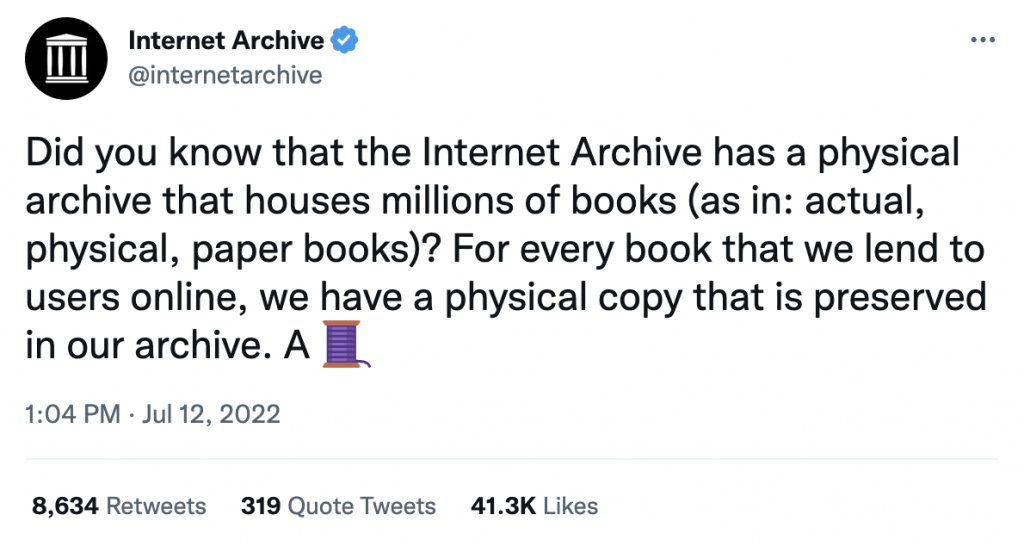
- One message really resonated online—people were surprised to learn that the Internet Archive has a physical archive that preserves all the physical books we’ve acquired and digitized.
- 2022 might go down as the year that people started to really understand what it means when libraries & individuals can no longer own content, like when streaming-only content vanishes from media platforms.
- Musician Max Collins wrote in Popula how “owning media is now an act of countercultural defiance,” walking readers through his first-hand example of how the streaming model doesn’t work for artists, only corporations.
- Brewster Kahle published, “Digital Books wear out faster than Physical Books,” countering the notion put forward by publishers that ebooks don’t wear out. In fact, Brewster notes that ebooks require “constant maintenance—reprocessing, reformatting, re-invigorating or they will not be readable or read.”
- Brewster’s post sparked the interest of LA Times business columnist Michael Hiltzik, who expanded on the issues around digital ownership in “Here’s why you can’t ‘own’ your ebooks.”
- To celebrate why it’s important to own books, and to help bring visibility to issues around digital ownership, we launched the participatory #OwnBooks campaign, which invited people to share photos with the oldest book, or most treasured volume, from their personal collection, like this signed copy of The Phantom Tollbooth.
- Author Glyn Moody published his latest book, Walled Culture, as a free ebook that you can download and own, or as a physical book that you can purchase in print.
- More publishers joined the movement to sell—not license—ebooks to libraries, including independent publisher 11:11 Press.
- In February, we launched Library as Laboratory, a new series exploring the computational use of Internet Archive collections. The series included segments from digital humanities scholars, computational scientists, web archiving professionals and other researchers.
- To help librarians and other information professionals better understand the decentralized web, Internet Archive partnered with the Metropolitan New York Library Council, DWeb, and Library Futures for a six-part series, Imagining a Better Online World: Exploring the Decentralized Web.
- During this year’s National Library Week, we invited readers to Meet the Librarians who work at the Internet Archive, highlighting the new roles our librarians lead in support of our mission, “Universal Access to All Knowledge.”
- Internet Archive joined with Creative Commons, Wikimedia Foundation and others in the Movement for a Better Internet, a collaborative effort to ensure that the internet’s evolution is guided by public interest values.
- Lila Bailey, Internet Archive’s senior policy fellow, and Michael Menna, policy fellow from Stanford University, released their report,”Securing Digital Rights for Libraries: Towards an Affirmative Policy Agenda for a Better Internet,” regarding libraries’ role in shaping the next iteration of the internet.
- Dave Hansen, one of the authors of the white paper on controlled digital lending, was named the new executive director of Authors Alliance.
- Carl Malamud received this year’s Internet Archive Hero Award for his lifelong mission to make public information freely available to the public.
- We hosted the first in-person Library Leaders Forum in three years, preceded by a virtual Forum that brought together hundreds of digital library enthusiasts to explore issues related to digital ownership and the future of library collections.
- We hosted a joint webinar with OCLC about our resource sharing pilots, including how to request articles from the Internet Archive via interlibrary loan.
- The Music Library Association made its publications openly available at Internet Archive.
- We began gathering content to support the newly announced Digital Library of Amateur Radio and Communications (DLARC), and then quickly surpassed 25,000 items in the collection.
- DISCMASTER, a new software tool, allows users to search across the contents of the tens of thousands of archived CD-ROMs at the Internet Archive.
- In August we celebrated the 20th anniversary of the Live Music Archive with a historical tour of the effort, which has resulted in hundreds of thousands of live sets available for listening at archive.org.
- Colgate University donated more than 1.5 million microfiche cards for preservation and digitization, covering topics including Census data, documents from the Department of Education, Congressional testimony, CIA documents, and foreign news translated into English.
- Facing an uncertain future, Hong Kong bookstore owner Albert Wan closed his pro-democracy, independent bookstore and donated the books to the Internet Archive for preservation and digitization.
- Do you have physical collections you’d like to donate to the Internet Archive? Check out our help document.
- The Copyright Wars with Peter Baldwin
- Data Cartels with Sarah Lamdan
- Walled Culture with Glyn Moody
- The History of the Computer with Rachel Ignotofsky
- How We Give Now with Lucy Bernholz
- The Library: A Fragile History with Andrew Pettegree and Arthur der Weduwen
- The Catalogue of Shipwrecked Books with Edward Wilson-Lee
- WHOLE EARTH: The Many Lives of Stewart Brand with John Markoff
The post 2022 Empowering Libraries Year in Review appeared first on Internet Archive Blogs.
Preserving Memory by Moonlight, Ensuring Access by Daylight
I made my first digital archive on a Windows PC in my parents’ bedroom.
I was a young fan of the Japanese anime Sailor Moon. My introduction to the show was through the English dubbed version that aired on Cartoon Network and an elementary school friend who supplied me with her copies of the translated manga. When I learned there was a dedicated online community with an extensive network of fan-made websites, filled with page after page of images, gifs and content I had never seen, my life changed.

I’d spend hours after school scouring fan-made Sailor Moon websites – not because there were that many I actually knew of, but because the image-heavy pages took several minutes to load. I quickly learned how to save files to my parent’s computer and began pasting downloaded images into a Microsoft Paint file. I didn’t know anything about building or publishing a website, and my computer skills were limited as a kid experiencing computers and the internet for the first time. All I knew was Internet Explorer, MS Paint, and Solitaire.

I’m not really sure why I felt compelled to download anything I found on the internet instead of just revisiting websites when I wanted to. Perhaps I didn’t want to spend another ten minutes waiting for the pages to load again. But in my child mind, I probably also saw saving an image as making it more tangible, that the files somehow belonged to me now. And, in a way, they did – I could edit, cut, paste, and print them out as much as my parents’ printer ink budget would allow. As long as I remembered to save the images, I didn’t have to worry about them disappearing one day.

As an adult, I place more importance on preserving digital media and memories. I admit I’ve always had a hard time letting things go—I’ve saved almost every handwritten letter and birthday card I’ve been given in my life. But what about the life and memories we make online? What about old computers, hard drives, cell phones, and social media accounts filled with personal photos and messages from lost and distant loved ones? These are memories that aren’t easily or obviously preserved.

Though my childhood computer is probably long gone, along with my digital collection of saved Sailor Scouts, I realize some 20 years later how vital, and fragile, digital memory is. With the eventual closure of websites like GeoCities, Angelfire, MySpace, and so many more, most of my earliest memories of the internet would be erased if it weren’t for the Internet Archive. Even as a child, I realized that digital memory is even more ephemeral than the physical media of previous generations.

As a member of a generation that grew up online, I am thankful that a large part of my digital memory doesn’t have to disappear forever. This is what drew me to the Internet Archive, and compelled me to support fundraising efforts to ensure a sustainable future for projects like the Wayback Machine, GifCities, and so much more. If you also find value in preserving digital memory and making it accessible for future generations, I hope you’ll consider donating to support our work before our year-end fundraising campaign comes to a close. Your matched donation will go a long way toward keeping our collections online for years to come.

Christina Humphreys joined the philanthropy team at the Internet Archive in 2021. Her interest in early internet art and aesthetics brought her to the Internet Archive, where many now defunct websites have been saved through the Wayback Machine. Along with reliving the internet of her childhood, she loves exploring the various collections of art, film, and books preserved on archive.org. She views the Internet Archive as a vital cultural resource, creating an accessible future for information and materials that would otherwise be locked away in a vault or lost to history.
GIFs sourced from: https://web.archive.org/web/20090831182622/http://geocities.com/Tokyo/Club/1029/scoutatt.html
The post Preserving Memory by Moonlight, Ensuring Access by Daylight appeared first on Internet Archive Blogs.
Internet Archive Welcomes Digital Humanists and Cultural Heritage Professionals to “Humanities and the Web: Introduction to Web Archive Data Analysis”
By The Community Programs Team
On November 14, 2022, the Internet Archive hosted Humanities and the Web: Introduction to Web Archive Data Analysis, a one-day introductory workshop for humanities scholars and cultural heritage professionals. The group included disciplinary scholars and information professionals with research interests ranging from Chinese feminist movements, to Indigenous language revitalization, to the effects of digital platforms on discourses of sexuality and more. The workshop was held at the Central Branch of the Los Angeles Public Library and coincided with the National Humanities Conference.
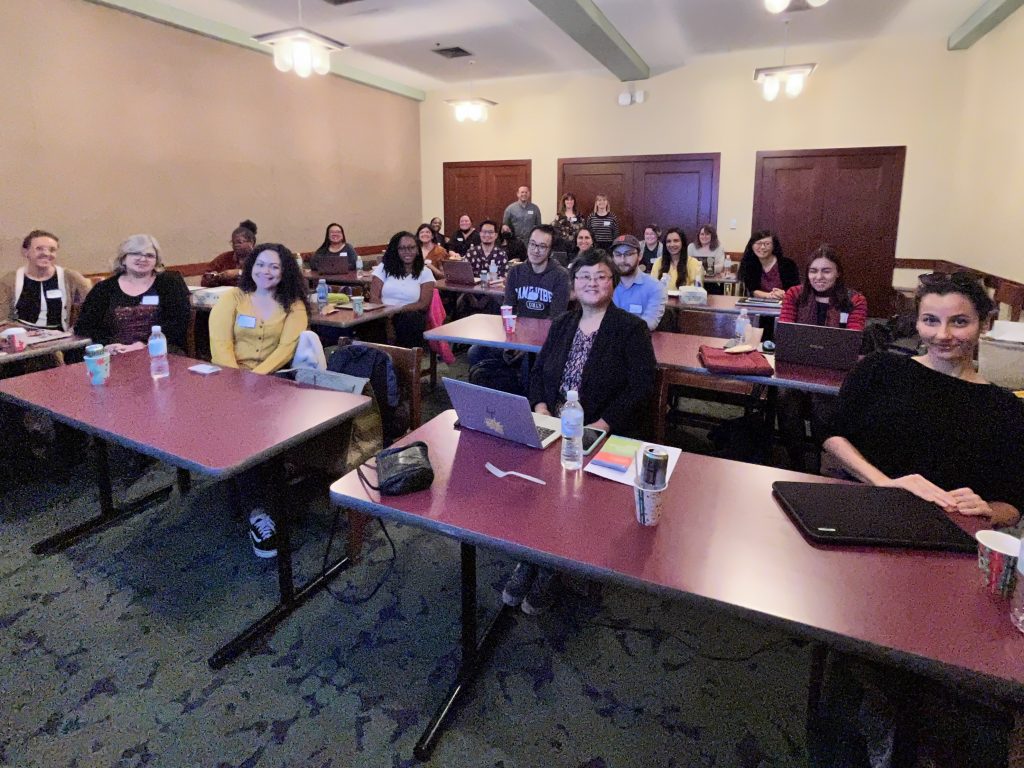 Attendees and Facilitators at Humanities and the Web: Introduction to Web Archive Data Analysis, November 14, 2022, Los Angeles Public Library
Attendees and Facilitators at Humanities and the Web: Introduction to Web Archive Data Analysis, November 14, 2022, Los Angeles Public Library
The goals of the workshop were to introduce web archives as primary sources and to provide a sampling of tools and methodologies that could support computational analysis of web archive collections. Internet Archive staff shared web archive research use cases and provided participants with hands-on experience building web archives and analyzing web archive collections as data.
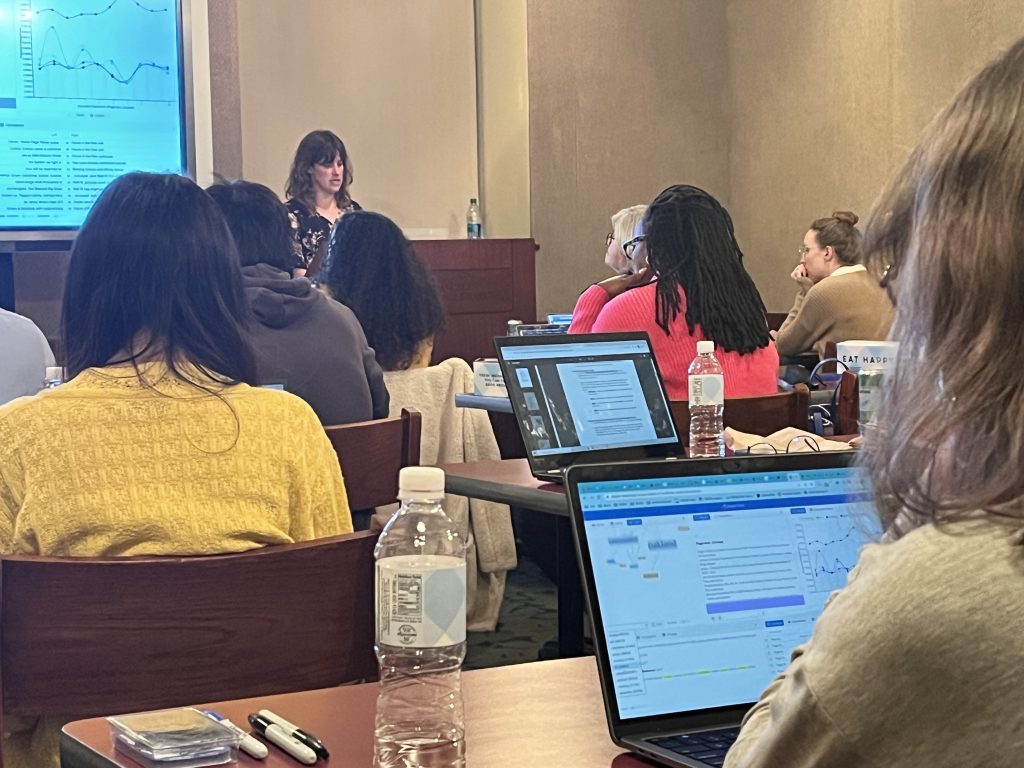 Senior Program Manager, Lori Donovan, guiding attendees in using Voyant to analyze text datasets extracted from an Archive-It collection using ARCH.
Senior Program Manager, Lori Donovan, guiding attendees in using Voyant to analyze text datasets extracted from an Archive-It collection using ARCH.
The workshop’s central feature was an introduction to ARCH (Archives Research Compute Hub). ARCH transforms web archives into datasets tuned for computational research, allowing researchers to, for example, extract all text, spreadsheets, PDFs, images, audio, named entities and more from collections. During the workshop, participants worked directly with text, network, and image file datasets generated from web archive collections. With access to datasets derived from these collections, the group explored a range of analyses using Palladio, RAWGraphs, and Voyant.
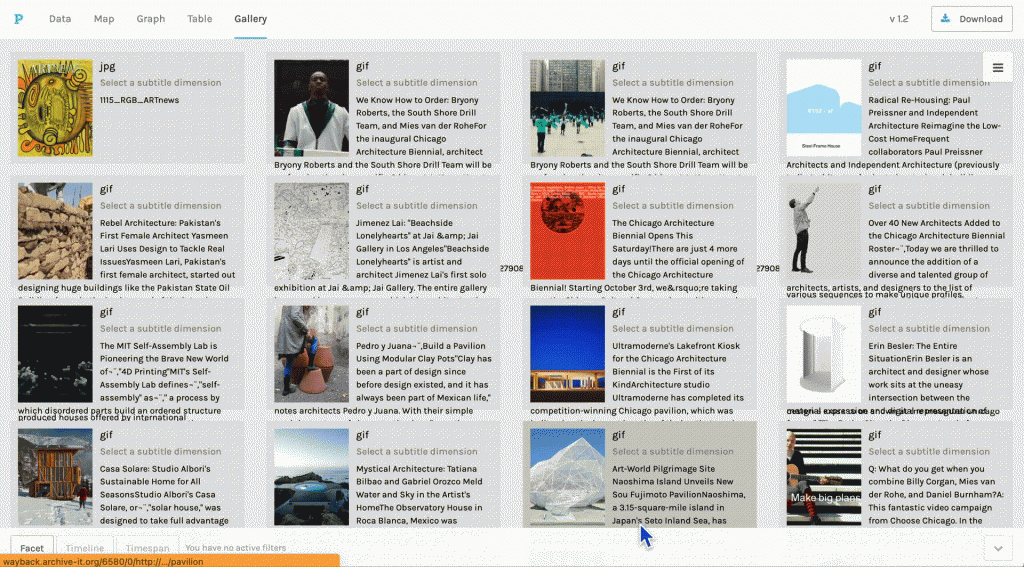 Visualization of the image files contained in the Chicago Architecture Biennial collection, created using Palladio based on an Image File dataset extracted from the collection using ARCH.
Visualization of the image files contained in the Chicago Architecture Biennial collection, created using Palladio based on an Image File dataset extracted from the collection using ARCH.
The high level of interest and participation in this event is indicative of the appetite within the Humanities for workshops on computational research. Participants described how the workshop gave them concrete language to express the challenges of working with large-scale data, while also expressing how the event offered strategies they could apply to their own research or could use to support their research communities. For those who were not able to make it to Humanities and the Web, we will be hosting a series of virtual and in-person workshops in 2023. Keep your eye on this space for upcoming announcements.
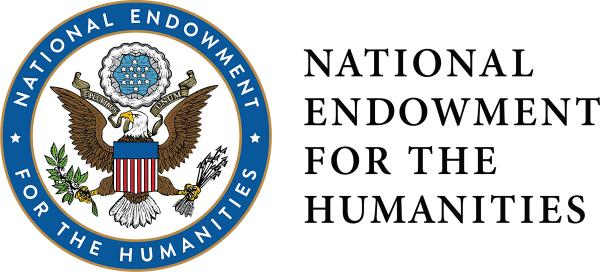
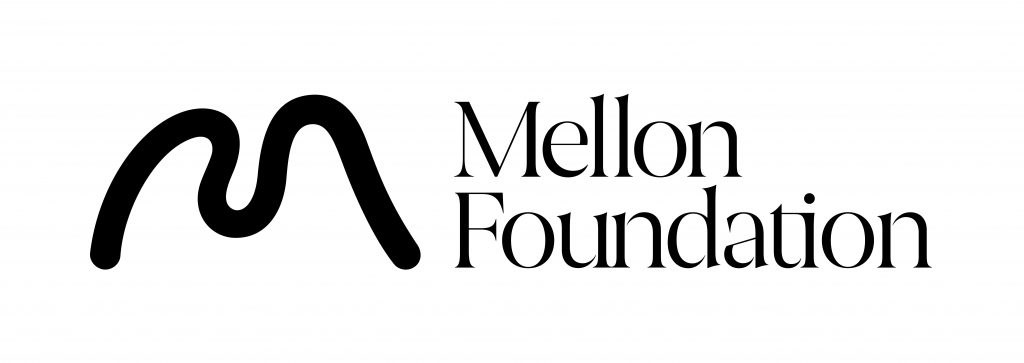
The post Internet Archive Welcomes Digital Humanists and Cultural Heritage Professionals to “Humanities and the Web: Introduction to Web Archive Data Analysis” appeared first on Internet Archive Blogs.
What Do Libraries Have To Do With Building a Better Internet?
When thinking about how to build a better internet—one that is focused on the public interest and promoting meaningful participation for everyone—libraries are key players. And to fulfill that role, libraries need to have policies that allow them to thrive online.
Just how to achieve that was the focus of a webinar sponsored by the Internet Archive and the Movement for a Better Internet on December 8, moderated by Chris Lewis, president and CEO of Public Knowledge.
Watch session recording:
At the event, library and internet policy experts discussed the recently released report, “Securing Digital Rights for Libraries: Towards an Affirmative Policy Agenda for a Better Internet.” Lila Bailey, senior policy counsel at the Internet Archive, and Michael Menna, policy fellow at the Internet Archive from Stanford University, coauthored the paper after consulting with thought leaders from libraries, academia, and civil society organizations.
“Libraries and the internet are both all about access and culture,” Bailey said. “They serve as democratizing forces in society, getting information to people and promoting robust and diverse participation in society.”
But libraries enjoy far higher societal trust in terms of providing access to reliable information, and the internet—and all who use it—could benefit from updated policies that support libraries operating more effectively in the digital space. Bailey said the library community and digital rights groups are worried about mandatory filtering proposals and publisher tactics that limit access to digital materials and lawful library functions like lending. “The seismic shift in the ecosystem is that publishers don’t sell ebooks to libraries, they only rent them on limited terms,” Bailey added.
To address these challenges, the report concludes that libraries must maintain four rights: to collect digital materials, preserve them over time, lend them to users, and cooperate with other libraries to share digital materials through standard library practices. Learn more about the report & findings in our previous post.
“The rights that libraries have always enjoyed offline, which align with the functions that they have played, need to be translated, protected, and clearly delineated online,” Bailey said.
Here’s how you can help libraries build a better information ecosystem in the 21st century:
- READ & SHARE the report, “Securing Digital Rights for Libraries: Towards an Affirmative Policy Agenda for a Better Internet.”
- JOIN the Movement for a Better Internet.
- SIGN UP for the Library Week of Action in 2023.
Katherine Klosek, director of information policy for the Association of Research Libraries, said the library community is deeply concerned about the potential impact of mandatory filtering on removal of content, censoring, and erosion of fair use. There is clear alignment with the new report and the ARL advocacy agenda, particularly in regard to copyright, said Klosek, highlighting her association’s Know Your Copyrights resource for library leaders.
“A lot of the challenges that libraries and cultural heritage institutions face today is due to the fact that copyright laws haven’t kept pace with the evolution of how people like to share on the internet,” said panelist Brigitte Vézina of Creative Commons. “They’re outdated. They’re unfit for the internet and sometimes they are just unclear.”
If copyright laws are not balanced and don’t contain enough exceptions, the repercussions go beyond the walls of the library, Vézina said. Limiting educational use of content impacts the public’s ability to access their fundamental right to cultural heritage, partake in creative endeavors, and infringes free expression. Indeed, solving the world’s biggest problems such as climate change and health issues, requires access to knowledge and fostering collaboration, Vézina added. Equitable access is key to ensuring that everyone can participate in solving these grand challenges.
As to how library rights affect the rights of authors and creators, the panelists were clear that balance was needed. “Author rights and library rights are not oppositional…they have worked together for centuries,” Bailey said. Libraries buy books, whether they are popular or not, which supports authors and allows future authors access to the resources they need to become readers and then writers. The key is finding compensation strategies and policies that actually benefit artists, rather than just enriching the platforms that control access.
“Building a better internet that is focused on public interest values is going to require making sure libraries function and thrive online,” said Bailey. To move the positive rights agenda for libraries forward, Bailey encouraged anyone interested to download, read and share the free, openly-licensed report here; get involved in the Library Week of Action planned in early 2023 and join the Movement for a Better Internet.
The post What Do Libraries Have To Do With Building a Better Internet? appeared first on Internet Archive Blogs.
Book Talk: Internet for the People
Join Internet Archive’s senior policy counsel LILA BAILEY in conversation with author BEN TARNOFF about his book, INTERNET FOR THE PEOPLE: THE FIGHT FOR OUR DIGITAL FUTURE.
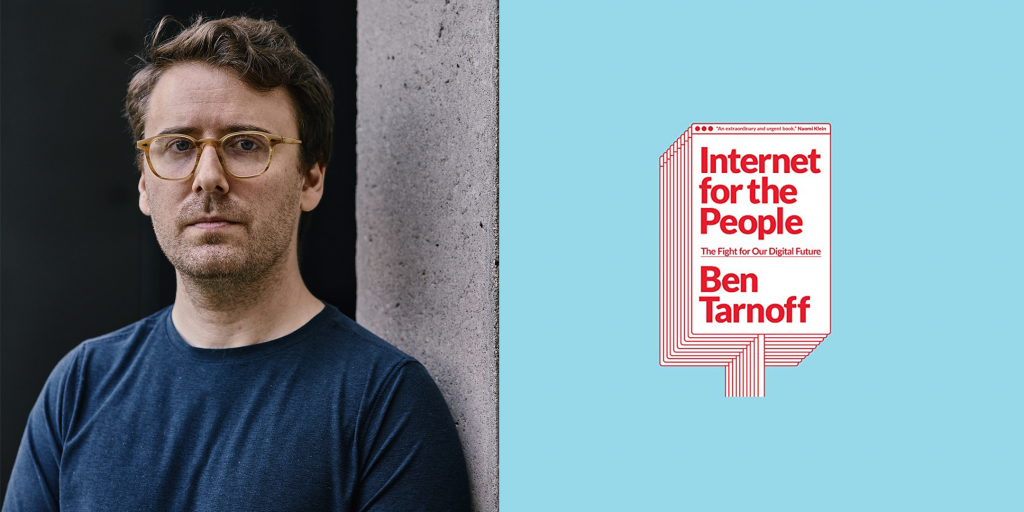
JANUARY 12 @ 6PM PT
THIS EVENT WILL BE HELD IN-PERSON AT THE INTERNET ARCHIVE, 300 FUNSTON AVE, SAN FRANCISCO.
Why is the internet so broken, and what could ever possibly fix it? The internet is broken, Tarnoff argues, because it is owned by private firms and run for profit. Google annihilates your privacy and Facebook amplifies right-wing propaganda because it is profitable to do so. But the internet wasn’t always like this—it had to be remade for the purposes of profit maximization, through a years-long process of privatization that turned a small research network into a powerhouse of global capitalism. Tarnoff tells the story of the privatization that made the modern internet, and which set in motion the crises that consume it today.
Book Talk: Internet for the People
IN-PERSON AT THE INTERNET ARCHIVE
January 12, 2023 @ 6pm PT
Register now for the free, in-person event
The post Book Talk: Internet for the People appeared first on Internet Archive Blogs.
Recap: Data Cartels Book Talk
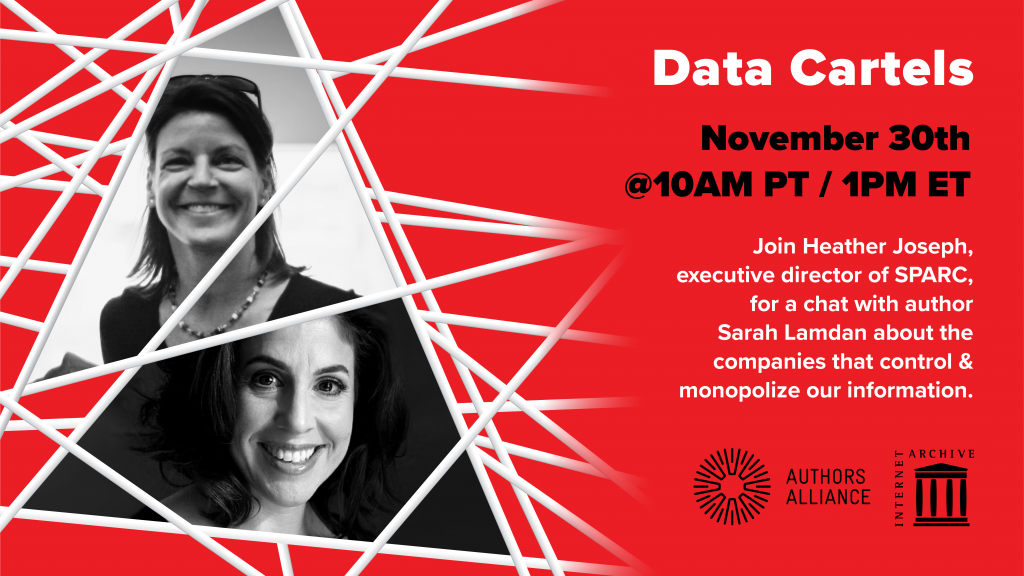
Sarah Lamdan was working as an academic law librarian at the City University of New York in 2017 when something concerning caught her eye.
“I was really startled and confused because I didn’t understand how Lexis and Westlaw would be doing ICE surveillance,” said Lamdan, who wondered about the potential impact on the campus’ immigrant population and her role as a librarian in giving away data.
Lamdan and a colleague wrote a blog for the American Association of Law Libraries raising questions. However, within minutes, at the “advice of legal counsel,” the post was removed, Lamden said. She didn’t know why they were not allowed to raise the issue, and her quest for answers began.
“It made me really, really curious,” Lamdan said. “That started this five-year course of research to unpack what these companies really are, what they’re doing, how they can be the main legal information providers and also be building surveillance systems.”
She shares her findings in “Data Cartels: The Companies that Control and Monopolize Our Information” published in November by Stanford University Press. Lamdan talked about her book with SPARC Executive Director Heather Joseph at an online webinar November 30 sponsored by the Internet Archive and the Authors Alliance. [Recording available here]
Watch Session Recording
The U.S. Immigration and Customs Enforcement (ICE) was building an invasive data surveillance system and journalists reported that Thomson Reuters and LexisNexis were interested in participating. She quickly realized that those were the parent companies of the gold-standard legal databases, Westlaw and Lexis, that Lamdan regularly taught students to use.
The book chronicles the unregulated underworld of a few companies that operate as “data cartels,” highlighting how selling data and informational resources perpetuate social inequalities and threaten the democratic sharing of knowledge.
In her research, Lamdan, who has a law degree and master’s in library science, said she was surprised to discover the scope of the enterprises and ways they leveraged users’ personal data without consent.
“I saw Lexis and Westlaw as these little mom-and-pop legal information expert shops that gave us tote bags and helped sponsor our annual meeting,” Lamdan said. “I didn’t realize that they are actually parts of these multi-billion-dollar giant corporations that are basically like informational warehouses.”
The library community has been increasingly concerned about companies’ commoditization of research, said Joseph, and the book spells about the trend with a sense of urgency.
“We think of these companies as content providers, but they’re more than that,” Joseph said. “They have a multiplicity of companies that have different functions under the umbrella company name and what those divisions do is critically important. For example, having one company essentially, owning the legal corpus of the United States and then controlling the data of people who access that information and distributing it is unbelievable.”
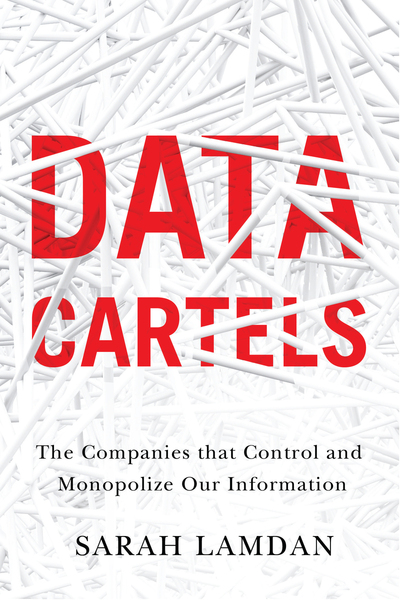 Purchase from the publisher, Stanford University Press
Purchase from the publisher, Stanford University Press
Too often, people view legal or academic publishers as benign distributors of useful information, Joseph said, but it is big business driven by profit. Companies are increasingly seeing opportunities to expand their services and become data analytic brokers. With so much information in the hands of so few players, these companies have a stronghold over predictive platforms affecting people’s privacy, health and finances.
Information is a unique commodity, Lamdan said, because one information product cannot be replaced with another similar product. Libraries can’t merely unsubscribe to these services or journals because students and attorneys rely on the unique informational products they provide. This has created a classic monopoly problem where consumers have little choice about which products they use, which Lamdan said should be addressed.
“Together, these companies are pivoting from publishing, towards data analytics. They are changing the way our information systems work and the way their markets work,” Lamdan said in the online talk. “They are acting in a way that drives us from information access to these closed walled garden data analytics systems that exploit our personal data and limit access to certain types of information.”
Lamdan is clear that there is no one fix to address the concentration of power in these information companies. She does, however, suggest that federal antitrust laws be revisited and revised to better address digital and data problems. Regulators could intervene to say that companies should not be allowed to be in both the business of providing critically important information to the public, and the business of selling personal data products to the government simultaneously.
Joseph said the broader community can break its dependency on these companies by expanding open access and creating an infrastructure that does not rely on commercial enterprises for information. Approaching knowledge as a public good, rather than a private commodity, can also shift the framework for how information is disseminated.
To find out more about Lamdan’s book or to purchase a copy, click here.
The post Recap: Data Cartels Book Talk appeared first on Internet Archive Blogs.
Internet Archive Releases Report on Securing Digital Rights for Libraries
We are excited to announce the release of our report, “Securing Digital Rights for Libraries: Towards an Affirmative Policy Agenda for a Better Internet,” and the culmination of a months-long process consulting with leading experts from libraries, civil society, and academia regarding libraries’ role in shaping the next iteration of the internet. The Internet Archive did this work in collaboration with the Movement for a Better Internet, so as to help model how this community can work together towards building an internet centered on public interest values.
You can download and read the free, openly-licensed report HERE.
The consultation focused on two core questions: How can libraries (1) sustain their traditional societal function and (2) build on their strengths to support a better information ecosystem in the 21st Century? Participants discussed a wide range of challenges, including consolidation in the publishing industry, mis/disinformation, and providing equitable access to information despite these obstacles. The conversation was anchored in libraries’ traditional support of public interest values—i.e. democracy, equity, diversity and inclusion, privacy, freedom of expression, and more.
The key takeaway from this consultation process is simple: The rights that libraries have always enjoyed offline must also be protected online. The report articulates a set of four digital rights for libraries, based on the core library functions of preserving and providing access to information, knowledge, and culture. Specifically, if libraries are to continue ensuring meaningful participation in society for everyone in the digital era, they must have the rights to:
- Collect digital materials, including those made available only via streaming and other restricted means, through purchase on the open market or any other legal means, no matter the underlying file format;
- Preserve those materials, and where necessary repair or reformat them, to ensure their long-term existence and availability;
- Lend digital materials, at least in the same “one person at a time” manner as is traditional with physical materials;
- Cooperate with other libraries, by sharing or transferring digital collections, so as to provide more equitable access for communities in remote and less well-funded areas.
The report is intended as a guide for meaningful policy discussions among librarians, public interest advocates, and lawmakers. We encourage you to read it and join us next Thursday, December 8th for a webinar discussion about the report with leaders from Internet Archive, Public Knowledge, Creative Commons, and the Association of Research Libraries. Come with your feedback, questions, and ideas for translating the conclusions of the report into actionable policy goals. We also encourage you to check out the Movement for a Better Internet, and join us there as we continue to work with different communities to build an internet that works better for everyone.
The post Internet Archive Releases Report on Securing Digital Rights for Libraries appeared first on Internet Archive Blogs.
The Best Things in Life Are Free: Two Ways to Celebrate Public Domain Day in 2023
The moon belongs to everyone, so says the 1927 hit musical composition, “The Best Things In Life Are Free.” We agree! In January of 2023, a treasure trove of new cultural works will become as free as the moon and the stars, and we at Internet Archive, Creative Commons and many other leaders from the open world plan to throw a party to celebrate!
Next year, works published in 1927 will join the myriad creative building blocks of our shared culture heritage. The public domain will grow richer with books from authors like Sir Arthur Conan Doyle, Marcel Proust, and Virginia Woolfe, silent film classics like the controversial The Jazz Singer with Al Jolson and Fritz Lang’s dystopian Metropolis, and snappy musical compositions like You Scream, I Scream, We All Scream For Ice Cream.
You can welcome new public domain works and party with us two ways:
Join us for a virtual party on January 19, 2023 at 1pm Pacific/4pm Eastern time where we will celebrate our theme, The Best Things In Life Are Free, with a host of entertainers, historians, librarians, academics, activists and other leaders from the open world, including additional sponsoring organizations Library Futures, SPARC, Authors Alliance, Public Knowledge, and the Duke Center for the Study of the Public Domain. REGISTER FOR THE VIRTUAL EVENT HERE!
The Internet Archive will also host an in-person Film Remix Contest Screening Party on January 20, 2023 at 6pm at 300 Funston Ave in San Francisco. We will celebrate 1927 as founding year of the Academy of Motion Picture Arts and Sciences, while watching this year’s Public Domain Day Remix Contest winning entries, eating popcorn and ice cream. Come dressed in your best golden age of Hollywood inspired costume and walk the red carpet with the Internet Archive as we celebrate the entry of “talkies” into the public domain. REGISTER FOR THE IN-PERSON PARTY IN SAN FRANCISCO HERE!
The post The Best Things in Life Are Free: Two Ways to Celebrate Public Domain Day in 2023 appeared first on Internet Archive Blogs.
Public Domain Day 2023 Remix Contest: The Internet Archive is Looking For Creative Short Films Made By You!
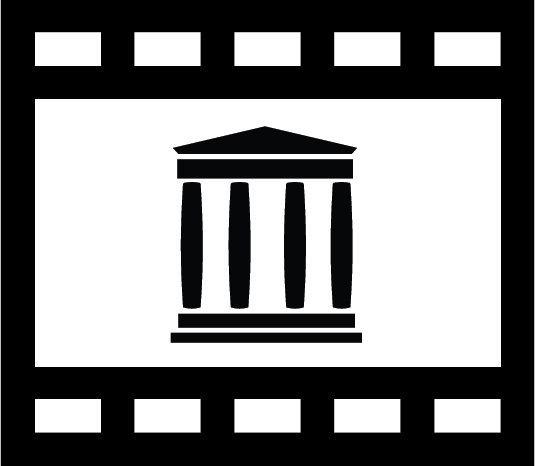
We are looking for artists of all levels to create and upload a short film of 2–3 minutes to the Internet Archive to help us celebrate Public Domain Day on 20 January 2023!
Public Domain Day is a celebration of all the rich materials that will be newly available to the public free of copyright restrictions. On January 1, 2023, most works published in 1927 will ascend into the Public Domain in the United States. We want artists to use this newly available content to create short films using resources from the Internet Archive’s collections from 1927.
The uploaded videos will be judged and prizes of up to $1500 awarded!! (Please see details below)
Winners will be announced and shown at the in-person Public Domain Day Celebration at the Internet Archive headquarters in San Francisco on 20 January 2023. All other participating videos will be added to a Public Domain Day Collection on archive.org and featured in a blog entry in January of 2023.
Here are a few examples of some of the materials that will become public domain on January 1, 2023:
- Books! e.g. The Complete Sherlock Holmes by Arthur Conan-Doyle (vol I and vol II), Death Comes for the Archbishop by Willa Cather, and Mosquitoes by William Faulkner
- Periodicals! E.g. issues from Life, The Billboard, and The Saturday Evening Post
- Sheet Music! E.g. The Best Things in Life Are Free, You Scream, I Scream, We All Scream For Ice Cream
- Movies! E.g. Metropolis, The Jazz Singer, and The King of Kings
Possible themes include, but are not limited to:
- The Best Things in Life Are Free
- Sleuthing the Public Domain
- What can 1927 teach us about 2023?
- Make a 2–3 minute movie using at least one work published in 1927 that will become Public Domain on January 1 , 2023. This could be a poem, book, film, musical composition, painting, photograph or any other work that will become Public Domain next year. The more different PD materials you use, the better!
- Note: If you have a resource from 1927 that is not available on archive.org, you may upload it and then use it in your submission. (Here is how to do that).
- Your submission must have a soundtrack. It can be your own voiceover or performance of a public domain musical composition, or you may use public domain or CC0 sound recordings from sources like Openverse and the Free Music Archive.
- Note: Sound recordings published before 1923 are in the public domain. Sound recordings published later than Jan 1, 1923 are NOT public domain, even if the underlying musical composition is, so watch out for this!
- Mix and Mash content however you like, but note that ALL of your sources must be from the public domain. They do not all have to be from 1927. Remember, U.S. government works are public domain no matter when they are published. So feel free to use those NASA images! You may include your own original work if you put a CC0 license on it.
- Add a personal touch, make it yours!
- Keep the videos light hearted and fun! (It is a celebration after all!)
All submissions must be in by Midnight, 16 January 2023 (PST)
How to Submit- Create an Internet Archive Account
- Upload your film to archive.org with a subject tag field of “public domain day film contest 2023” in the upload form (see example here)
- Link all your sourced materials from 1927 in the upload description
- 1st prize: $1500
- 2nd prize: $1000
- 3rd prize: $500
*All prizes sponsored by the Kahle/Austin Foundation
JudgesJudges will be looking for videos that are fun, interesting and use public domain materials, especially those from 1927. They will be shown at the in-person Public Domain Day party and should highlight the value of having cultural materials that can be reused, remixed, and re-contextualized for a new day. Winners’ pieces will be purchased with the prize money, and viewable on the Internet Archive under a Creative Commons license.
- Amir Saber Esfahani (Director of Special Arts Projects, Internet Archive)
- Rick Prelinger (Board Member, Internet Archive, Founder, Prelinger Archives)
- Yuanxiao Xu (Deputy Counsel, Creative Commons)
Previous Winners:
The post Public Domain Day 2023 Remix Contest: The Internet Archive is Looking For Creative Short Films Made By You! appeared first on Internet Archive Blogs.
What is the Democracy’s Library?
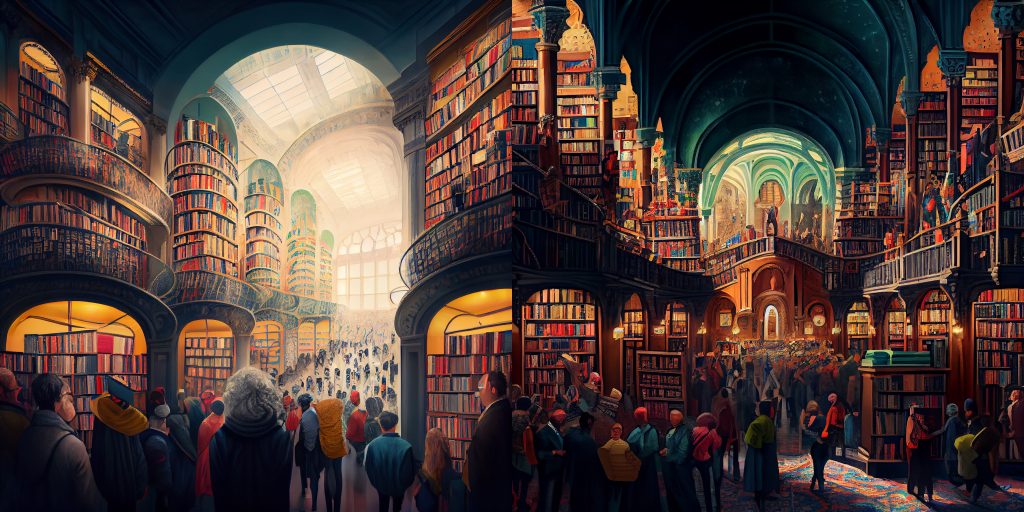 Illustration created with MidJourney
Illustration created with MidJourney
Democracies require an educated citizenry to flourish– and because of this, Democratic governments, at all levels, spend billions of dollars publishing reports, manuals, books, videos so that all can read and learn. That is the good news. The bad news is that in our digital age, much of this is not accessible. Democracy’s Library aims to change this.
The aim of the Internet Archive Democracy’s Library is to collect, preserve and make freely available all the published works of all the democracies– the federal, provincial, and municipal government publications– so that we can efficiently learn from each other to solve our biggest challenges in parallel and in concert.
Democracy’s Library is the foundational information of free people.
We call this “Democracy’s Library” because Democracy is an open system that trusts its citizens to learn, grow and have independent agency. Democratic governments publish openly because they want important information spread widely. There are no paywalls to the works of government, or there shouldn’t be.
We need access to all the River reports so we can help understand and manage our declining clean water. Access to Agricultural research to help farm more sustainably. To Materials research to build better products and devices. To Local hearings on project results so other cities can overcome the same challenges. To Training materials and text books for many professions. All free– and in ways you can find them.
Bringing free public access to the public domain is the opportunity of the Internet– an infrastructure that effectively costs nothing to distribute information that has been collected and organized.
Yes, this will cost a small fortune– but it is within our grasp– to collect and organize billions of documents and datasets, preserve the materials for the ages and make them available for many purposes. While scoping projects in the United States and Canada have now begun, we estimate this project will cost at least $100 million dollars. The big money has not been committed yet, and we’re still fundraising. But to get things kicked off, Filecoin Foundation (FF) and Filecoin Foundation for the Decentralized Web (FFDW), are supporting the project. The Internet Archive has ramped up government websites and datasets as well as digitizing print materials with many library partners.
Thankfully, we do not have the rights and paywall problems that have been strangling the Internet’s best feature: an essentially free information distribution system.
Democracy’s Library can be a free public library available on your phone and your laptop.
Democracy’s Library will be the foundation of new services, both non-commercial and commercial, that leverages language understanding, machine learning, automatic translation, speech recognition, and visualizations.
Democracies publish openly– let’s take advantage of this. Leverage our library system to not just lease commercial publisher’s database products, but build open collections that everyone can use and reuse without limitation.
Lets build direct conduits from governments into Democracy’s Library for long term preservation and access. A public-public partnership that long served us in the paper era, that took a pause in the mainframe era of commercial databases, can flourish again in the Internet era.
“Public Access to the Public Domain” can be a rallying cry for Democracy’s Library.
Democracy’s Library can be a flowering of information services for free people.
Please join in and help. Jamie Joyce of the Internet Archive (jamiejoyce@archive.org) is leading the effort in the United States, Andrea Mills of the Internet Archive Canada ( andrea@archive.org ) is leading the Canadian effort. The project is overseen by Brewster Kahle ( brewster@archive.org ).
If you’d like to stay connected, sign up for the #EmpoweringLibraries newsletter.
Have ideas? Have materials? Have a use case? Have resources to bring to bear? This can only happen if we work together.
Let’s build Democracy’s Library, together.
The post What is the Democracy’s Library? appeared first on Internet Archive Blogs.
JUST ADDED: Three new events to close out 2022
We’ve just finished scheduling three new events through the end of the year that you won’t want to miss! All events are virtual, free and open to the public.
Can’t make one of the sessions? Go ahead and register so that you’ll receive an e-mail with the session recording.

Join HEATHER JOSEPH, executive director of SPARC, for a chat with DATA CARTELS author SARAH LAMDAN about the companies that control & monopolize our information.
REGISTER NOW: DATA CARTELSIn our digital world, data is power. Information hoarding businesses reign supreme, using intimidation, aggression, and force to maintain influence and control. SARAH LAMDAN brings us into the unregulated underworld of these “data cartels”, demonstrating how the entities mining, commodifying, and selling our data and informational resources perpetuate social inequalities and threaten the democratic sharing of knowledge.
This event is co-sponsored with Authors Alliance.
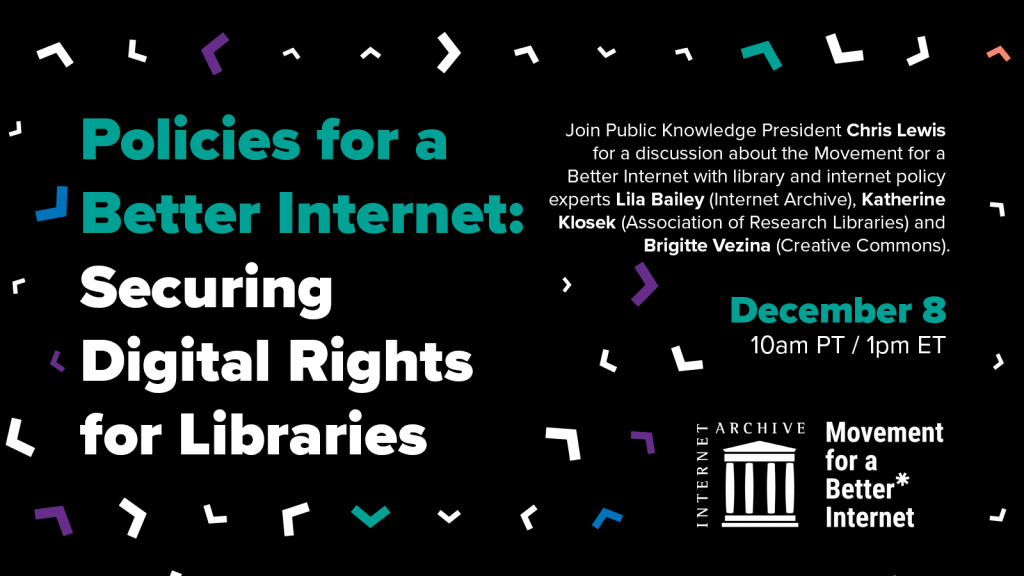
What do libraries have to do with building a better internet? How would securing certain digital rights for these traditional public interest institutions help make the internet work better for everyone?
REGISTER NOW: POLICIES FOR A BETTER INTERNETJoin Public Knowledge President CHRIS LEWIS as he facilitates a conversation on these issues and the emerging Movement for a Better Internet with library and internet policy experts LILA BAILEY (Internet Archive), KATHERINE KLOSEK (Association of Research Libraries) and BRIGITTE VÉZINA (Creative Commons).
They will discuss Internet Archive’s forthcoming report “Securing Digital Rights for Libraries: Towards an Affirmative Policy Agenda for a Better Internet” along with ongoing copyright reform projects from Creative Commons and ARL.
This event is co-sponsored with the Movement for a Better Internet.
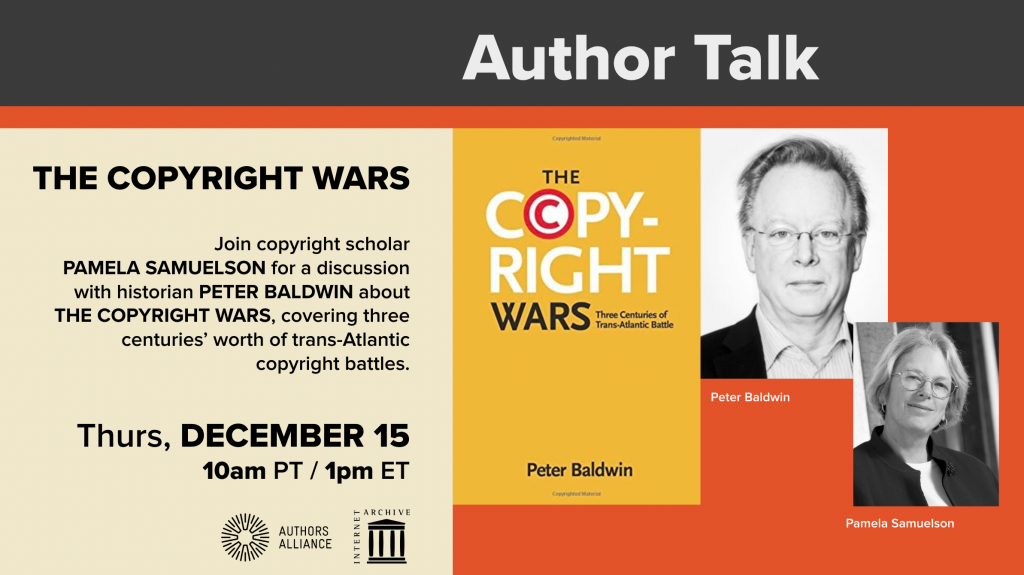
Join copyright scholar PAMELA SAMUELSON for a discussion with historian PETER BALDWIN about THE COPYRIGHT WARS, covering three centuries’ worth of trans-Atlantic copyright battles.
REGISTER NOW: THE COPYRIGHT WARSToday’s copyright wars can seem unprecedented. Sparked by the digital revolution that has made copyright—and its violation—a part of everyday life, fights over intellectual property have pitted creators, Hollywood, and governments against consumers, pirates, Silicon Valley, and open-access advocates. But while the digital generation can be forgiven for thinking the dispute between, for example, the publishing industry and libraries is completely new, the copyright wars in fact stretch back three centuries—and their history is essential to understanding today’s battles. THE COPYRIGHT WARS—the first major trans-Atlantic history of copyright from its origins to today—tells this important story.
This event is co-sponsored with Authors Alliance.
The post JUST ADDED: Three new events to close out 2022 appeared first on Internet Archive Blogs.
Author Talk: Peter Baldwin, The Copyright Wars

Join copyright scholar PAMELA SAMUELSON for a discussion with historian PETER BALDWIN about THE COPYRIGHT WARS, covering three centuries’ worth of trans-Atlantic copyright battles.
REGISTER NOWToday’s copyright wars can seem unprecedented. Sparked by the digital revolution that has made copyright—and its violation—a part of everyday life, fights over intellectual property have pitted creators, Hollywood, and governments against consumers, pirates, Silicon Valley, and open-access advocates. But while the digital generation can be forgiven for thinking the dispute between, for example, the publishing industry and libraries is completely new, the copyright wars in fact stretch back three centuries—and their history is essential to understanding today’s battles. THE COPYRIGHT WARS—the first major trans-Atlantic history of copyright from its origins to today—tells this important story.
THE COPYRIGHT WARS is available to read or download from the Internet Archive, as designated by the author. You can also purchase the book in print from Princeton University Press, or your local bookshop.
This event is co-sponsored with Authors Alliance.
Author Talk: Peter Baldwin, The Copyright Wars
Thursday, December 15 @ 10am PT / 1pm ET
Register now for the virtual event.
The post Author Talk: Peter Baldwin, The Copyright Wars appeared first on Internet Archive Blogs.
Policies for a Better Internet: Securing Digital Rights for Libraries

What do libraries have to do with building a better internet? How would securing certain digital rights for these traditional public interest institutions help make the internet work better for everyone?
REGISTER NOWJoin Public Knowledge President CHRIS LEWIS as he facilitates a conversation on these issues and the emerging Movement for a Better Internet with library and internet policy experts LILA BAILEY (Internet Archive), KATHERINE KLOSEK (Association of Research Libraries) and BRIGITTE VÉZINA (Creative Commons).
They will discuss Internet Archive’s forthcoming report “Securing Digital Rights for Libraries: Towards an Affirmative Policy Agenda for a Better Internet” along with ongoing copyright reform projects from Creative Commons and ARL.
Policies for a Better Internet: Securing Digital Rights for Libraries
Thursday, December 8 @ 10am PT / 1pm ET
Register now for the virtual event
CHRIS LEWIS is President and CEO at Public Knowledge. Prior to being elevated to President and CEO, Chris served for as PK’s Vice President from 2012 to 2019 where he led the organization’s day-to-day advocacy and political strategy on Capitol Hill and at government agencies. During that time he also served as a local elected official, serving two terms on the Alexandria City Public School Board. Chris serves on the Board of Directors for the Institute for Local Self Reliance and represents Public Knowledge on the Board of the Broadband Internet Technical Advisory Group (BITAG).
LILA BAILEY is Senior Policy Counsel for the Internet Archive. She leads the team responsible for the legal and policy strategies supporting the non-profit library’s mission to enable Universal Access to All Knowledge. Lila has spent her career as a passionate advocate of democratizing access to information, culture, and educational resources. In 2020, Public Knowledge recognized Lila’s contributions to public interest technology policy as the 17th annual winner of the IP3 award in the category of Intellectual Property. Fortune Magazine named her a “copyright champion” for her work leading the Archive’s fair use defense against four major commercial publishers in the Hachette v. Internet Archive case about digital book lending. Lila holds a JD from Berkeley Law and a BA in Philosophy from Brown University.
KATHERINE KLOSEK is the Director of Information Policy at the Association of Research Libraries (ARL).As a member of the ARL Scholarship and Policy team, Katherine formulates Association positions on key information policy debates, and develops and implements advocacy strategies to advance the Association’s legal and public policy agenda in legislative, administrative, and judicial forums. Building strong partnerships with stakeholders in libraries, higher education, scholarship, and civil society, she represents the Association in outreach to policy makers on Capitol Hill and in the executive branch. Serving as the staff lead to ARL’s Advocacy and Public Policy Committee, Katherine helps mobilize ARL’s membership to influence government policy–making in key moments, and in responding and adapting to major legal and policy developments.
BRIGITTE VÉZINA is the Director of Policy, Open Culture, and GLAM at Creative Commons. Brigitte is passionate about all things spanning culture, arts, handicraft, traditions, fashion and, of course, copyright law and policy. She gets a kick out of tackling the fuzzy legal and policy issues that stand in the way of access, use, re-use and remix of culture, information and knowledge.
The post Policies for a Better Internet: Securing Digital Rights for Libraries appeared first on Internet Archive Blogs.
Tips for requesting articles from Internet Archive on OCLC’s resource sharing network
On November 9, Internet Archive participated in a webinar hosted by OCLC that showed librarians how to request articles from our library using OCLC tools.
The Recording and Slides (PDF download) from the event are now available.
How do I request articles from the Internet Archive?
- To learn how, watch the recording—starting at timestamp 12:25 minutes—and view slides 21- 30 (PDF).
- Create/update your custom holdings to include IAILL in the group you use for copy requesting.
- Learn more about how to set up custom holding groups and custom holding paths.
- Send copy requests to the Custom Holdings Path including IAILL using Automated Request Manager.
- If you have Tipasa, add IAILL to your group of Proven Senders.
- If you have ILLiad, make IAILL an Odyssey Trusted Sender.
- If Internet Archive indicates that they own the year/volume you need, you can simply add IAILL to your lender string.
- From the Holdings page, filter to the article date you need, select the custom holdings path including IAILL, and click go to populate the lender string.
- Create/update your custom holdings to include IAILL in the group you use for copy requesting.
- Have questions about how to set up your custom holdings groups and paths? Please contact OCLC Support.

Key facts about the Internet Archive
- Internet Archive’s OCLC symbol: IAILL
- Internet Archive supplies for FREE
- Internet Archive is fast—and deliver in an average of 37 minutes
- Articles delivered electronically through Article Exchange
- All PDFs are provided with full OCR (Optical Character Recognition)
Questions?
- Learn more about Internet Archive’s resource sharing activities.
- If you have any questions about how to request articles from Internet Archive through OCLC, feel free to contact OCLC Support.
The post Tips for requesting articles from Internet Archive on OCLC’s resource sharing network appeared first on Internet Archive Blogs.
Digital Library of Amateur Radio & Communications Surpasses 25,000 Items
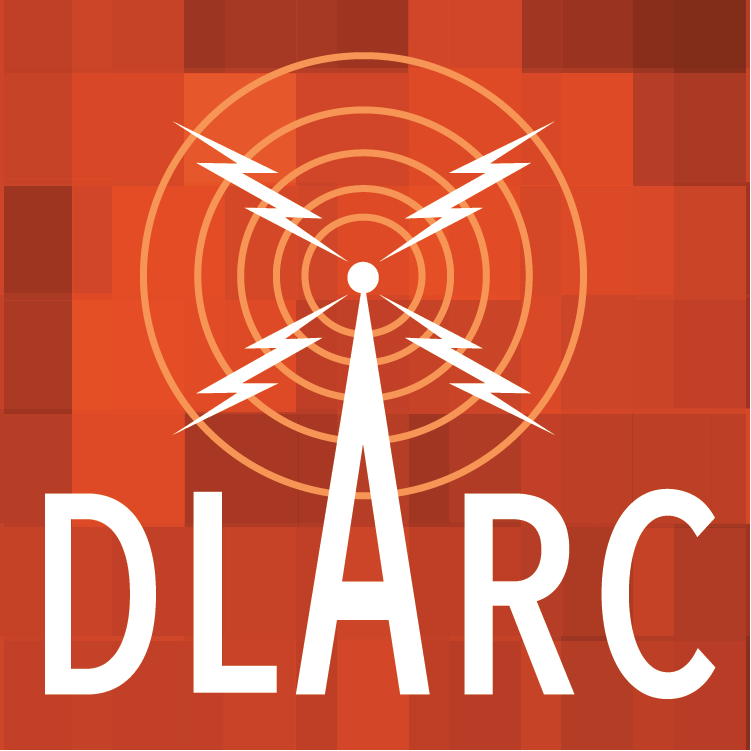
In the six weeks since announcing that Internet Archive has begun gathering content for the Digital Library of Amateur Radio and Communications (DLARC), the project has quickly grown to more than 25,000 items, including ham radio newsletters, podcasts, videos, books, and catalogs. The project seeks additional contributions of material for the free online library.
You are welcome to explore the content currently in the library and watch the primary collection as it grows at https://archive.org/details/dlarc.
The new material includes historical and modern newsletters from diverse amateur radio groups including the National Radio Club (of Aurora, CO); the Telford & District Amateur Radio Society, based in the United Kingdom; the Malta Amateur Radio League; and the South African Radio League. The Tri-State Amateur Radio Society contributed more than 200 items of historical correspondence, newspaper clippings, ham festival flyers, and newsletters. Other publications include Selvamar Noticias, a multilingual digital ham radio magazine; and Florida Skip, an amateur radio newspaper published from 1957 through 1994.The library also includes the complete run of 73 Magazine — more than 500 issues — which are freely and openly available.
More than 300 radio related books are available in DLARC via controlled digital lending. These materials may be checked out by anyone with a free Internet Archive account for a period of one hour to two weeks. Radio and communications books donated to Internet Archive are scanned and added to the DLARC lending library.
Amateur radio podcasts and video channels are also among the first batch of material in the DLARC collection. These include Ham Nation, Foundations of Amateur Radio, the ICQ Amateur/Ham Radio Podcast, with many more to come. Providing a mirror and archive for “born digital” content such as video and podcasts is one of the core goals of DLARC.
Additions to DLARC also include presentations recorded at radio communications conferences, including GRCon, the GNU Radio Conference; and the QSO Today Virtual Ham Expo. A growing reference library of past radio product catalogs includes catalogs from Ham Radio Outlet and C. Crane.
DLARC is growing to be a massive online library of materials and collections related to amateur radio and early digital communications. It is funded by a significant grant from Amateur Radio Digital Communications (ARDC) to create a digital library that documents, preserves, and provides open access to the history of this community.
Anyone with material to contribute to the DLARC library, questions about the project, or interest in similar digital library building projects for other professional communities, please contact:
Kay Savetz, K6KJN
Program Manager, Special Collections
kay@archive.org
Mastodon: dlarc@mastodon.radio
The post Digital Library of Amateur Radio & Communications Surpasses 25,000 Items appeared first on Internet Archive Blogs.
Digital Books wear out faster than Physical Books
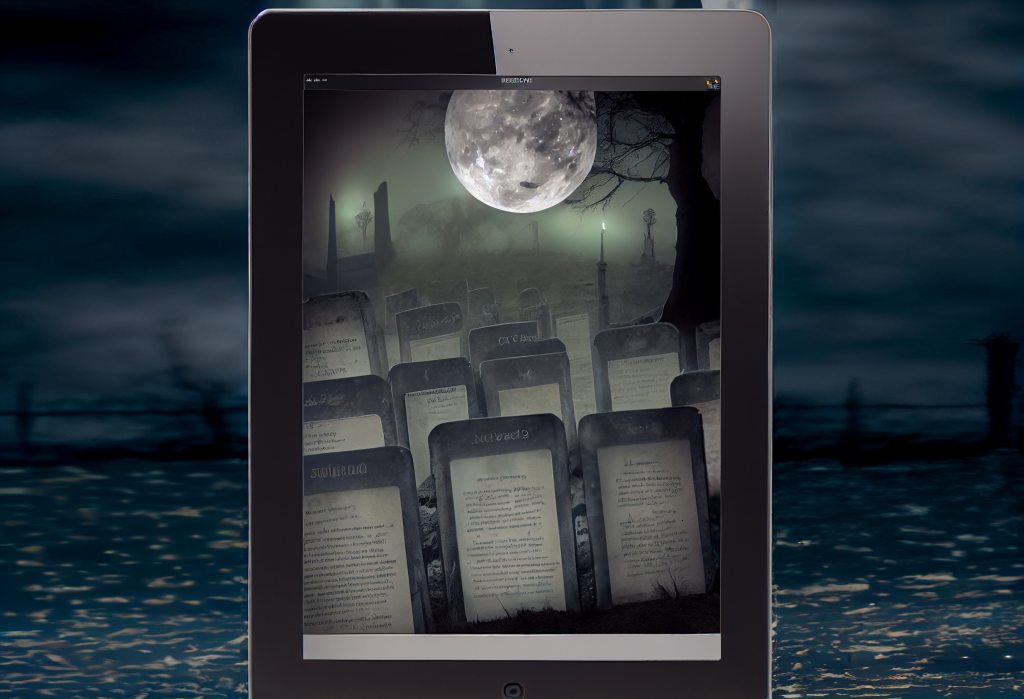
Ever try to read a physical book passed down in your family from 100 years ago? Probably worked well. Ever try reading an ebook you paid for 10 years ago? Probably a different experience. From the leasing business model of mega publishers to physical device evolution to format obsolescence, digital books are fragile and threatened.
For those of us tending libraries of digitized and born-digital books, we know that they need constant maintenance—reprocessing, reformatting, re-invigorating or they will not be readable or read. Fortunately this is what libraries do (if they are not sued to stop it). Publishers try to introduce new ideas into the public sphere. Libraries acquire these and keep them alive for generations to come.
And, to serve users with print disabilities, we have to keep up with the ever-improving tools they use.
Mega-publishers are saying electronic books do not wear out, but this is not true at all. The Internet Archive processes and reprocesses the books it has digitized as new optical character recognition technologies come around, as new text understanding technologies open new analysis, as formats change from djvu to daisy to epub1 to epub2 to epub3 to pdf-a and on and on. This takes thousands of computer-months and programmer-years to do this work. This is what libraries have signed up for—our long-term custodial roles.
Also, the digital media they reside on changes, too—from Digital Linear Tape to PATA hard drives to SATA hard drives to SSDs. If we do not actively tend our digital books they become unreadable very quickly.
Then there is cataloging and metadata. If we do not keep up with the ever-changing expectations of digital learners, then our books will not be found. This is ongoing and expensive.
Our paper books have lasted hundreds of years on our shelves and are still readable. Without active maintenance, we will be lucky if our digital books last a decade.
Also, how we use books and periodicals, in the decades after they are published, change from how they were originally intended. We are seeing researchers use books and periodicals in machine learning investigations to find trends that were never easy in a one-by-one world, or in the silos of the publisher databases. Preparing these books for this type of analysis is time consuming and now threatened by publisher’s lawsuits.
If we want future access to our digital heritage we need to make some structural changes: changes to institution and publisher behaviors as well as supportive funding, laws, and enforcement.
The first step is to recognize preservation and access to our digital heritage is a big job and one worth doing. Then, find ways that institutions– educational, government, non-profit, and philanthropic– could make preservation a part of our daily responsibility.
Long live books.
The post Digital Books wear out faster than Physical Books appeared first on Internet Archive Blogs.
We have added a Mastodon Server
The Internet Archive has recently set up its own Mastodon server– a federated/decentralized open source social media package– that has garnered lots of attention lately.
We use it in ways that we use twitter now (we are not leaving twitter):
• @internetarchive@mastodon.archive.org for events, announcements, and fun things
• Staff accounts (e.g. my account @brewsterkahle@mastodon.archive.org) for, well, whatever.
Why? We need a game with many winners, not just a few powerful players.
Through our dweb work, the Internet Archive has catalyzed decentralized web technologies through conferences, summits, meet-ups and camps for 6 years. We need new tech to help with privacy, robustness, and work around issues of disinformation, and corporate consolidation. Mastodon is built on open standards so others can build alternative clients and integrate it into other systems.
Looking forward to many social media alternatives: Blue Sky, Matrix, and many others.
Personally, I want to see the evolution and combination of features of Slack, Twitter, SMS, Signal, email, Discord, Facebook, IRC, zoom, google meet, and other ways we communicate. While we are at it, how about a more integrated environment of zendesk, jira, wordpress, and google docs. Free and open technologies that invite interoperability while communities maintain control would be ideal. And in my day-to-day I would love fewer systems to monitor that also limit my direct exposure to celebrities, influencers, and politicians. Oh, I can dream…
Twitter
Facebook
Mastodon
Donations
Physical donations
Please help us learn, this time about Mastodon. Thank you, all!
The post We have added a Mastodon Server appeared first on Internet Archive Blogs.
Book Talk: Data Cartels

Join SPARC’s Heather Joseph for a chat with author Sarah Lamdan about the companies that control & monopolize our information.
Book Talk: Data Cartels with Sarah Lamdan & Heather Joseph
Co-sponsored by Internet Archive & Authors Alliance
Wednesday, November 30 @ 10am PT / 1pm ET
Register now for the virtual discussion.
 Purchase Data Cartels from The Booksmith
Purchase Data Cartels from The Booksmith
In our digital world, data is power. Information hoarding businesses reign supreme, using intimidation, aggression, and force to maintain influence and control. Sarah Lamdan brings us into the unregulated underworld of these “data cartels”, demonstrating how the entities mining, commodifying, and selling our data and informational resources perpetuate social inequalities and threaten the democratic sharing of knowledge.
About the speakers
Sarah Lamdan is Professor of Law at the City University of New York School of Law. She also serves as a Senior Fellow for the Scholarly Publishing and Academic Resources Coalition, a Fellow at NYU School of Law’s Engelberg Center on Innovation Law and Policy.
Heather Joseph is a longtime advocate and strategist in the movement for open access to knowledge. She is the Executive Director of SPARC, an international alliance of libraries committed to creating a more open and equitable ecosystem for research and education. She leads SPARCs policy efforts, which have produced national laws and executive actions supporting the free and open sharing of research articles, data and textbooks, and has worked on international efforts to promote open access with organizations including the United Nations,, The World Bank, UNESCO, and the World Health Organization.
Book Talk: Data Cartels with Sarah Lamdan & Heather Joseph
Co-sponsored by Internet Archive & Authors Alliance
Wednesday, November 30 @ 10am PT / 1pm ET
Register now for the virtual discussion.
The post Book Talk: Data Cartels appeared first on Internet Archive Blogs.







































































































![Reference manager - [Onderhoud aantekeningen]](http://labyrinth.rienkjonker.nl/sites/default/files/styles/medium/public/Reference%20manager%20v3%20-%20%5BOnderhoud%20aantekeningen%5D%2014-2-2010%20102617_0.jpg?itok=OJkkWhxY)
![Reference manager - [Onderhoud aantekeningen]](http://labyrinth.rienkjonker.nl/sites/default/files/styles/medium/public/Reference%20manager%20v3%20-%20%5BOnderhoud%20aantekeningen%5D%2014-2-2010%20102628.jpg?itok=CUvhRRr7)
![Reference manager - [Onderhoud bronnen] - Opnemen en onderhouden](http://labyrinth.rienkjonker.nl/sites/default/files/styles/medium/public/Reference%20manager%20v3%20-%20%5BOnderhoud%20bronnen%5D%2014-2-2010%20102418.jpg?itok=d7rnOhhK)
![Reference manager - [Onderhoud bronnen]](http://labyrinth.rienkjonker.nl/sites/default/files/styles/medium/public/Reference%20manager%20v3%20-%20%5BOnderhoud%20bronnen%5D%2014-2-2010%20102433.jpg?itok=CgS8R6cS)
![Reference manager - [Onderhoud bronnen]](http://labyrinth.rienkjonker.nl/sites/default/files/styles/medium/public/Reference%20manager%20v3%20-%20%5BOnderhoud%20bronnen%5D%2014-2-2010%20102445_0.jpg?itok=4oJ07yFZ)
![Reference manager - [Onderhoud bronnen]](http://labyrinth.rienkjonker.nl/sites/default/files/styles/medium/public/Reference%20manager%20v3%20-%20%5BOnderhoud%20bronnen%5D%2014-2-2010%20102500.jpg?itok=ExHJRjAO)
![Reference manager - [Onderhoud bronnen]](http://labyrinth.rienkjonker.nl/sites/default/files/styles/medium/public/Reference%20manager%20v3%20-%20%5BOnderhoud%20bronnen%5D%2014-2-2010%20102524.jpg?itok=IeHaYl_M)
![Reference manager - [Onderhoud bronnen]](http://labyrinth.rienkjonker.nl/sites/default/files/styles/medium/public/Reference%20manager%20v3%20-%20%5BOnderhoud%20bronnen%5D%2014-2-2010%20102534.jpg?itok=cdKP4u3I)
![Reference manager - [Onderhoud thema's en rubrieken]](http://labyrinth.rienkjonker.nl/sites/default/files/styles/medium/public/Reference%20manager%20v3%20-%20%5BOnderhoud%20themas%20en%20rubrieken%5D%2020-9-2009%20185626.jpg?itok=zM5uJ2Sf)













![Reference manager - [Raadplegen aantekeningen]](http://labyrinth.rienkjonker.nl/sites/default/files/styles/medium/public/Reference%20manager%20v3%20-%20%5BRaadplegen%20aantekeningen%5D%2020-9-2009%20185612.jpg?itok=RnX2qguF)
![Reference manager - [Relatie termen (thesaurus)]](http://labyrinth.rienkjonker.nl/sites/default/files/styles/medium/public/Reference%20manager%20v3%20-%20%5BRelatie%20termen%20%28thesaurus%29%5D%2014-2-2010%20102751.jpg?itok=SmxubGMD)
![Reference manager - [Thesaurus raadplegen]](http://labyrinth.rienkjonker.nl/sites/default/files/styles/medium/public/Reference%20manager%20v3%20-%20%5BThesaurus%20raadplegen%5D%2014-2-2010%20102732.jpg?itok=FWvNcckL)
![Reference manager - [Zoek thema en rubrieken]](http://labyrinth.rienkjonker.nl/sites/default/files/styles/medium/public/Reference%20manager%20v3%20-%20%5BZoek%20thema%20en%20rubrieken%5D%2020-9-2009%20185546.jpg?itok=6sUOZbvL)
![Reference manager - [Onderhoud rubrieken]](http://labyrinth.rienkjonker.nl/sites/default/files/styles/medium/public/Reference%20manager%20v3%2020-9-2009%20185634.jpg?itok=oZ8RFfVI)

![Reference manager - [Onderhoud aantekeningen]](http://labyrinth.rienkjonker.nl/sites/default/files/styles/medium/public/Reference%20manager%20v3%20-%20%5BOnderhoud%20aantekeningen%5D%2014-2-2010%20102603.jpg?itok=XMMJmuWz)


































































